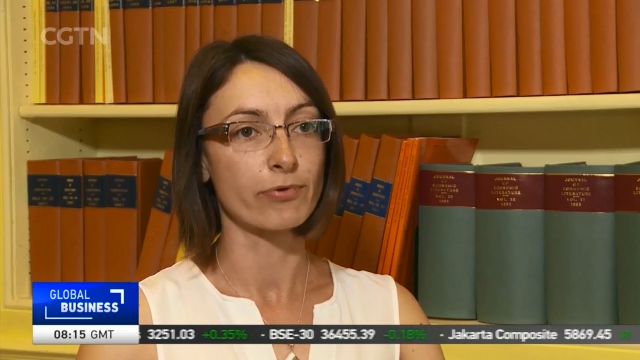
17:13, 18-Jul-2018
Global Growth Stalled: Rising trade tensions could cost 430 billion dollars
Updated
16:32, 21-Jul-2018
03:28

Great Britain's oldest economic think tank is warning that the world's consumers are likely to be the first casualties of an escalating global trade war. That comes as the International Monetary Fund says that rising tensions between the United States and the rest of the world could cost the global economy 430 billion dollars. Marta Paczos of the Institute of Economic Research says that it's ordinary people who will suffer should the trade war expand. Richard Bestic has more from London.
MARTA PACZOS INSTITUTE OF ECONOMIC RESEARCH "As consumers are being hit by higher prices and the main reason for that is first of all tariffs they reduce trade. There is less competition and the price is included. Trade wars are not a thing that benefits anyone."
RICHARD BESTIC LONDON "The U.S. president Donald Trump complains of unfair trade practices on the part of the European Union and China. Does he have a point in that?"
MARTA PACZOS INSTITUTE OF ECONOMIC RESEARCH "I'm not entirely sure what the bad deal is, so if the bad deal by the Trump administration is defined as a trade deficit or bilateral trade deficit, this is not a metric that you should assess trade deals, it is not something that you first, you can influence by trade policy. And secondly, it's not necessarily with the economic theory a bad thing.
RICHARD BESTIC LONDON "China has now complained to the World Trade Organization the WTO. But that complaint is going to languish there for years, isn't it."
MARTA PACZOS INSTITUTE OF ECONOMIC RESEARCH "I'm not sure about that because there's for sure a pressure to resolve and address it very fast and it's, I would say, it's critical to the existence of WTO. Definitely, there is a 'tit for tat' dynamics because both the European Union and also Canada, China, all those countries they responded with tariffs to the U.S. initial move. So I think the crucial role of WTO is exactly those de-escalation powers that it has. We have a rule based system we can file in the complaint. It can take some time of course about I mean this is a discussion that should we should be having."
RICHARD BESTIC LONDON "How much worse could the trade war get?"
MARTA PACZOS INSTITUTE OF ECONOMIC RESEARCH "So far the actual implemented tariffs on the U.S. side they cover something they cover approximately 4 percent of U.S. imports. So this may not be a very large number but there are serious plans and there is ongoing the national security threat investigation that may lead to its tariffs affecting up to 25 percent of U.S. imports in autumn. So this could be a really substantial number."
RICHARD BESTIC LONDON "From the evidence you've seen. Do you get the impression that this is going to be a long drawn out affair, this trade war, or could it be over quickly?"
MARTA PACZOS INSTITUTE OF ECONOMIC RESEARCH "It's very hard to make forecasts about future especially in this policy environment. That's changing from day to day both on the Chinese side and on the European Union side. There is a Common agreement that we should de-escalate as much as we can so like the filing. Filing the complaints with WTO going back to the rules based system. Clinging to the rules is a way of the de-escalating this conflict. But what can happen? We should just see and wait."

SITEMAP
Copyright © 2018 CGTN. Beijing ICP prepared NO.16065310-3
Copyright © 2018 CGTN. Beijing ICP prepared NO.16065310-3